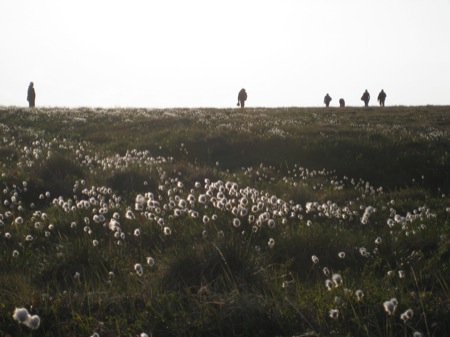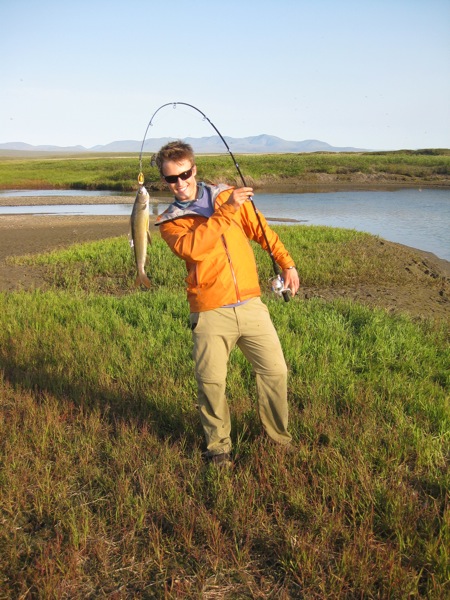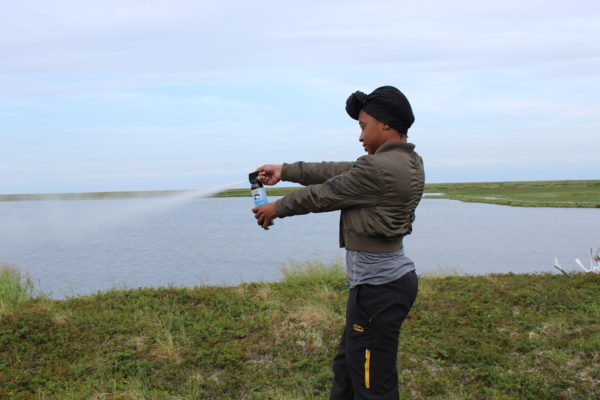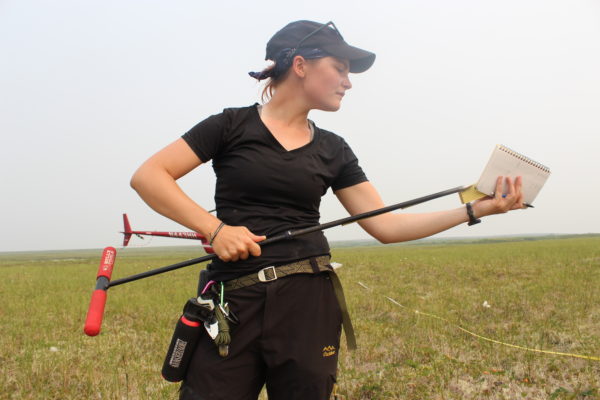Today there is excitement among our group for many reasons. We are still riding the high from our unbelievable day trip to the tundra. 
Yesterday morning, after a brief breakfast, we strapped on the life vests and headed north along the Kolyma River. Along the way, we stopped at a few points to refuel and sample some smaller streams that fed into the Kolyma.
These breaks allowed us to better see how the landscape and ecosystems changed as we ventured into higher latitudes. The larch trees became sparser, many of the dwarfed willows and larch disappeared, and the peat groundcover was being outcompeted by grasses. Further north, we passed small snow patches that clung to the north side of the hills, avoiding some exposure to the sun. The banks had changed from eroding Yedoma soils to exposed rocky headlands. Most noticeably, the Boreal forest had transformed into sprawling grassland. The mosquitoes had diminished, we could see the contours of the landscape, and the cool breeze brought in the fresh arctic air. We made it to the tundra.

Personally, the tundra is one of the most special places I’ve seen. I have been above the altitudinal treeline multiple times but crossing the latitudinal treeline is something not many people have a chance to experience. After a brief but intense snowball fight, we settling into a spot on the bank of a small stream filled with Arctic Greyling. We tried our hand at fishing them out, with some having more luck than others. Our return trip south was beautifully accented by the brief sunset, with the sun just dipping below the horizon and then reemerging. There aren’t many places where you can experience sunset and sunrise within 25 minutes.
Today, we are in a bit of a frenzy. We’re wrapping up our sampling and trying to run any remaining experiments. On top of this, we were excited to see our project featured on the New York Time’s DotEarth blog. So, as we race around tying up loose ends, we’re trying to respond to reader’s questions and comments. It’s been a great couple of days.




Comments(6)-
-
-
-
-
-
Monique Kantor says
July 24, 2009 at 9:20 pmNYTIMES–How Fabulous! The more I read, the more fascinating, disconcerting, and real these issues have become.
We’d like to add our wishes to the many that have been bestowed upon Chris in hopes that his birthday truly is a happy and remarkable one.
Michele says
July 24, 2009 at 9:27 pmwhat’s the buzz …. tell me what’s a happening? wow! sunrise and sunset as you described, Travis – must be word defying! and to be beyond the latitudinal treeline! congrats on the NY Times deal – you are all outstandingly amazing people sharing a life changing adventure! Return home and share your spirit.
MIF
John says
July 25, 2009 at 4:09 amLove the Jesus Christ Superstar reference! What great pictures.
lewis says
July 25, 2009 at 4:55 amI’m the Program Director at the National Science Foundation who worked with your PI, Max Holmes, in getting this project funded. All I can say is Congratulations to Everyone! This is such a wonderful project and a great example of what we hoped International Polar Year would do!
You classroom preparation and field work are fantastic and your contributions to helping us understand global climate change are greatly appreciated.
I wish I’d had the opportunity to participate in an experience like this as an undergraduate – your world view has become larger and will be forever different. Congratulations to the faculty and students who made this happen. Eileen Lewis
betsy says
July 25, 2009 at 7:09 amYour work is sobering. Your energy, enthusiasm, and smarts are remarkable!
BRAVO!
Doug says
July 27, 2009 at 6:50 pmGreat post everyone! This adventure sounds more like real science all the time.
Surprising that there are still folks questioning the climate question (Re: the NYT blog) …I write this in 91 degrees of Fahrenheit in Portland OR…I know, I know, this is weather not climate, but it does remind you that we should be paying attention!
I am jealous of the Salvelinus fishing, need to tell us fish heads what species! What are they biting on, you know, the important research data!
Keep up the good work!
Hosanna Hey!
doug!